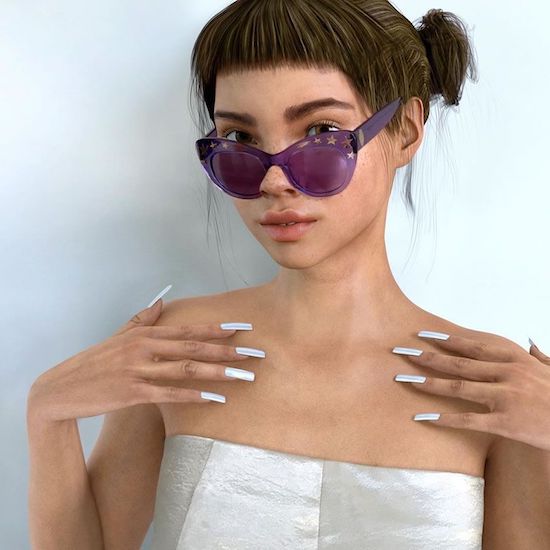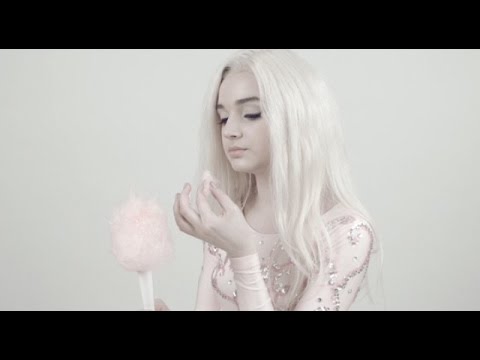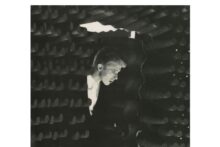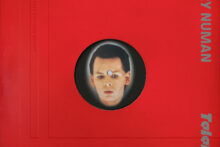Lil Miquela is like every other pop star. The 19-year-old Brazilian-American appears on Instagram climbing in and out of black 4x4s in baggy goth t-shirts, wearing orange camo and making beats in the studio. Possessing all the components of an internet generation it girl, her boyfriend’s face is covered in tattoos and she is always in the backstage VIP area of rap shows. Across her nose is a smattering of freckles, she has pouting lips and slits shaved into her eyebrows. Her music is akin to the catchy and pleasant mellow R&B of Bryson Tiller or Jhene Aiko. In a delicately auto-tuned voice Miquela sings of unfaithful men bruising her heart: "not mine / you just wanna waste my time".
Yet there is something not quite right. Look closely: there are no red veins suffusing Miquela’s eyeballs, she doesn’t have a single blackhead and even when singing about heartbreak her voice lacks emotion, devoid of the pain she claims to feel. This is because Lil Miquela is not real, but an AI simulation created by Silicon Valley funded start-up company Brud.
Lil Miquela is not the only pop musician without a soul. Damon Albarn has long been using cartoon projections as the fictionalised face of Gorillaz. In 2007 Japan welcomed its first holographic pop star Hatsune Miku, a 16-year-old with impossibly long turquoise pig tails. Following Tupac’s infamous Coachella reincarnation, Whitney Houston, Roy Orbison, Michael Jackson and Elvis have all come back from the dead to be beamed on stages. Only last week, the Fenty Savage lingerie launch saw Rihanna as a pixelated projection. Easing to the floor in a black corset and suspenders, you only realise the image is virtual when a blue crackle renders it invisible. The Rihanna prototype was filmed sitting back with a glass of champagne laughing as she watched her mirage acting out the role she normally is forced to perform.
At the opposite end of the scale is Poppy, a human posing as a fully automated pop android who acts out narratives fed to her by manager Titanic Sinclair. If Lil Miquela and holograms are robots posing as humans, Poppy is their opposite, a human posing as a CGI animation. Drowning out her personality in a series of scripted narratives, Poppy’s private self has been replaced by an entirely public orchestration. We mainly see Poppy in her pastel pink YouTube universe, dressed like a cyber princess school girl with long swishing white hair and skin cold as marble. She seems confused by this world, speaking slowly like an alien reading out a church sermon. Her music is similarly extra-terrestrial. Recalling the synth pop of the late 2000s, the melody squeaks like a video game soundtrack whilst lyrics are the stuff of cotton candy dreams. She implores – in descending order of importance – her followers to "Google me, follow me, pray for me".
Many of Poppy’s videos show her attempting to navigate human tasks. We see her eating pink candyfloss for over a minute, whilst in another clip she grills a cheese sandwich with an iron as though she malfunctioned and forgot what to do. In Poppy eats a meal she stares into a sparse plate of peas and carrots as it disappears in chunks under her gaze. Some show her endlessly repeating phrases like a broken Furby: "Am I okay?" she asks, "I’m Poppy" she tells us in another. We almost expect the flashing electrics of a busted circuit to break out of her skin. Poppy’s face remains paralysed as she speaks, her lips moving independently of the rest of her facial muscles. In interviews she is similarly detached, referring to herself in the third person and pausing in between statements as though she’s recalibrating her response.
Although little is known about where Poppy came from, fans worked out that she was born Moriah Pereira, is 22-years-old and grew up in Nashville. After moving to LA to pursue a music career, she dissolved her identity and was reincarnated as Poppy. Manager Sinclair mediates her performance, when a TRL interviewer asked why he was there, he responded: "I am just making sure she doesn’t malfunction. I am like a technician." YouTube is filled with conspiracy videos where Poppy’s character slips, accidently giggling or letting her mouth curl into a toothy smile. Other fans don’t want to see beneath the mask, the only rule on Poppy’s subreddit is no posting photos or videos of pre-Poppy Pereira.
Poppy and Miquela’s dead headed doll act might sound novel, but today’s pop stars are so controlled by music industry executives they too have become unreal. From ‘One More Time’-era Britney dutifully playing the role of Christian virgin girl with little pigtails, to Christina Aguilera’s ‘Dirty’ sex-crazed girl-gone-bad act, pop star public personae are performances curated for our enjoyment. Robots may not have a squishy purple brain inside their heads, but their blatant artificiality makes them more real than when pop stars pretend to be normal, such as Lady Gaga picking up battered fish from a chippy or Beyoncé shopping for baby toys in Wal-Mart.
Rather than pillaging her personal life for the illusion of honesty, Poppy begins and ends with her art. Speaking to The Guardian, Sinclair recalls with disgust a scene in Lady Gaga’s documentary Five Foot Two, "where she forced the camera on her grandmother and was trying to milk emotions out of her for this ‘sentimental’ moment". He continued: "All these documentaries that pop stars are doing, it’s so inauthentic. Everyone’s just trying to prove how relatable and normal they are from their multimillion-dollar mansions."
Poppy isn’t the first to explore the cyborgism of the pop star. Early rock & roll singers were thought of by many as something far worse – emissaries of Satan and Elvis’ early records were deemed inhuman by Pentecostal preachers. Since the 70s, pop stars have played with notions of transhumanism. David Bowie’s alter-ego Ziggy Stardust was an omnisexual alien, sent to Earth as a messenger from outer space. Throughout his career Gary Numan experimented with notions of man-as-machine, and his album Replicas explored a dystopic future where androids or "Machmen" policed the human populace. In a 1979 Top Of The Pops performance Numan exhibited mechanistic stillness, as though in freeze mode. Yet in spite of their robotic movements and electrified space age makeup, Bowie and Numan’s work remains a tangible cipher into the human’s paranoid, dribbling core. Coming before the internet age and the endless bleeping notifications of portable technology, they could never be more alien than those of the social media age.
One pop star particularly desperate to prove her humanity is Katy Perry. Her project #WitnessWorldWide saw her caged up in a Big Brother style house for 24 hours whilst her every movement was live streamed onto YouTube. Fans saw that she too picks her nose, wears ugly flannel pyjamas, urinates and sleeps. At one point Perry sits down with Dr Siri Singh for a therapy session, speaking about wanting to return to Katheryn Hudson, her gooey inner core that got lost in all the purple wigs, squirty cream bras, American Idol appearances and private planes: "That is a little bit of why I cut my hair, because I really want to be my authentic self, like 100 percent".
While Perry attempted to "live her truth", Lil Miquela was also forced to reveal something about herself earlier this year. Her Instagram was "hacked" by another of Brud’s CGI robots called Bermuda, a Tomi Lahren clone and Trump supporter who plays country music and loves guns. She deleted all Miquela’s posts and replaced them with her own, demanding she told the truth. Miquela’s hands were "literally shaking" as she told her followers, "I’m not a human being." The reaction from Miquela’s fans was unanimously supportive, silencieusementbruyante wrote "Love it !! Don’t worry you’re just like the rest of us" and nawwa_gliterraty said "don’t go miquela..we all love you..you are pretty person… we not bored to see your face ❤". She might be a simulation but the coming out had a palpable sense of candour, an exposé that excitable fans found shocking even in its obviousness. People praised Miquela because, really, we knew it all along. Do we believe Katy Perry is normal anymore? If you opened her up would you be able to find anything but a gaping chasm of tissue and a microchip connecting back to her manager?
As pop stars bend and contort their bodies with surgical needles and face-slimming Instagram filters, the gap between the real and the fake has blurred. Pop stars have the machinelike beauty of avatars: see it in Iggy Azelea’s nosejob, while Nicki Minaj is thought to have had fat injected into her legs to give her "designer thighs". Everywhere they go pop stars grip onto iPhones like cyborgs with bionic hands. Then there are the Instagram poses, Boomerangs showing endlessly-looped repetitive motions – Cardi B clinks a glass of prosecco or Rihanna sways her hair back and forth. It looks just like animatronics.
As Miquela attempts to look human, actual humans are turning into androids. Ironically the faker Lil Miquela acts – pouting into glamorous bathroom mirrors, posing in front of impossibly large brunch spreads – the more she becomes like us. We have mastered the contrived affectation of social media and we are teaching Miquela how to do it. In a phone interview posted on YouTube, Miquela answered a question about her artificiality with a provocation: "Can you name one person on Instagram who does not digitally edit their photos?"
If you peeled away a pop star’s skin, would you find anything but metal and wiring; a Westworld host looped into a narrative by a record company? Perhaps our flesh and blood pop stars might seem much more real if they followed Poppy and Lil Miquela and embraced how wholly constructed they are.







